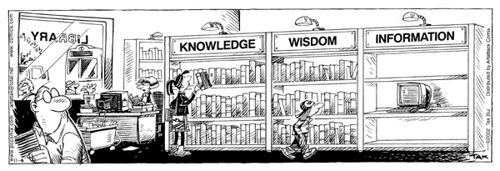On Friday October 7, the Collaborative for Multilingual Writing and Research (CMWR) hosted our first Conversation Group, an initiative designed to address the needs of DePaul and English Language Academy (ELA) students looking to improve their English language skills. You may not have heard of the Conversation Groups before, because it’s a brand new facet of the CMWR initiative, one that was conceptualized by some very quick thinking done by CMWR Coordinator Laura Friddle and the ELA faculty members.
The need for the Conversation Groups was realized during our first Book Club meeting of the quarter. The book selection for fall quarter, in correspondence with Banned Books Week, was Fahrenheit 451, a book chosen for its length, its banned-book status, and its content: it could provide some great discussion on civic liberties, the power of written language, and the implications of technology’s creeping expansion into how we communicate, process information and structure our lives.
The launch of the Book Club was met with enthusiasm by students from a variety of disciplines, and that first meeting was attended by around thirty students representing a broad range of language proficiency. Recognizing that some of the language in Fahrenheit might prove challenging to some, we wanted to give students an opportunity to participate in our Friday afternoon initiative regardless of language level. Thus, the Conversation Group was created as a space where we would focus more on topics of American popular culture in large group discussions.
For our first Conversation Group, facilitated by myself and Elliot Crumpley, we had about nine students attend and participate. The hour was spent talking about different American holidays (Halloween and Thanksgiving in particular—and it was pretty difficult trying explain the history of Halloween traditions), how to meet more people at DePaul, and favored modes of communication between peers in America. It was essentially a Q&A session on any questions or concerns the students had and wanted advice on—it could even be looked at as one big Conversation Appointment.
We’ve since held two more sessions, and both have been enjoyable and enlightening for all of us involved. We usually don’t focus solely on American culture since nearly all of our returning students are Chinese, and we’ll ask them about aspects of Chinese culture to contrast with the relating American perspective. We also talk about specifics within the English language, and how to interpret them. For example, in our second session, we spent a good amount of time discussing the below cartoon, and really differentiating the meaning of the terms knowledge, wisdom and information—and how technology relates to, or emphasizes, those distinctions.
 The Conversation Groups allow for a collaborative, informal setting in which all of us participants can not only explore aspects of American culture, but also focus on certain nuances within English that may not be as engaging to learn otherwise. Overall, this initiative has proven to be a great learning experience for all involved. I for one certainly feel more knowledgeable—perhaps also a little bit more wise?—knowing about, say, the significance of ghosts in Chinese holidays, though for me it also just reinforces how Halloween ghosts are not significant at all, really, except for being a very cheesy costume idea. My budding costume frustrations aside, I must say that I’m looking forward to our next session.
The Conversation Groups allow for a collaborative, informal setting in which all of us participants can not only explore aspects of American culture, but also focus on certain nuances within English that may not be as engaging to learn otherwise. Overall, this initiative has proven to be a great learning experience for all involved. I for one certainly feel more knowledgeable—perhaps also a little bit more wise?—knowing about, say, the significance of ghosts in Chinese holidays, though for me it also just reinforces how Halloween ghosts are not significant at all, really, except for being a very cheesy costume idea. My budding costume frustrations aside, I must say that I’m looking forward to our next session.
